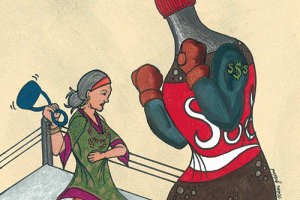Friday Nite Videos | December 27, 2019
Portside
The global obesity rate is on the rise, having nearly tripled since the 1970s. Hasan examines how federal policy and corporations like Coca-Cola helped America export its unhealthy diet to the rest of the world.
 This study isn’t the only one to show the positive impacts of sugary beverage taxes. This study on Berkeley’s soda tax found a whopping 21 percent decrease in sugary beverage consumption. At Harvard, researchers predicted that Philadelphia’s sugary beverage tax, which went into effect this year, could prevent 36,000 cases of obesity over 10 years, prevent more than 2,000 cases of diabetes in the first year after the tax reaches its full effect, and save $200 million.
This study isn’t the only one to show the positive impacts of sugary beverage taxes. This study on Berkeley’s soda tax found a whopping 21 percent decrease in sugary beverage consumption. At Harvard, researchers predicted that Philadelphia’s sugary beverage tax, which went into effect this year, could prevent 36,000 cases of obesity over 10 years, prevent more than 2,000 cases of diabetes in the first year after the tax reaches its full effect, and save $200 million.
 Interview with behavioral scientist Dr. Brian Wansink, author of Mindless Eating (2006) and Slim by Design (2014) and founder of the Food and Brand Lab at Cornell University. The Food and Brand Lab was started in 1997 at the University of Illinois (before moving to Cornell in 2005), to explore how humans relate to food with the end goal of uncovering solutions to improve eating environments and help individuals eat better. Wansink analyzes why we eat what we eat.
Interview with behavioral scientist Dr. Brian Wansink, author of Mindless Eating (2006) and Slim by Design (2014) and founder of the Food and Brand Lab at Cornell University. The Food and Brand Lab was started in 1997 at the University of Illinois (before moving to Cornell in 2005), to explore how humans relate to food with the end goal of uncovering solutions to improve eating environments and help individuals eat better. Wansink analyzes why we eat what we eat.
 Obesity is one of the biggest public health challenges of the 21st century, affecting more than 500 million people worldwide and costing at least $200 billion each year in the United States alone. It contributes to cardiovascular disease, type 2 diabetes, and cancer. Scientists have now uncovered a genetic circuit that controls whether our bodies burn or store fat. Manipulating that genetic circuit may offer a new approach for obesity treatments.
Obesity is one of the biggest public health challenges of the 21st century, affecting more than 500 million people worldwide and costing at least $200 billion each year in the United States alone. It contributes to cardiovascular disease, type 2 diabetes, and cancer. Scientists have now uncovered a genetic circuit that controls whether our bodies burn or store fat. Manipulating that genetic circuit may offer a new approach for obesity treatments.
Spread the word